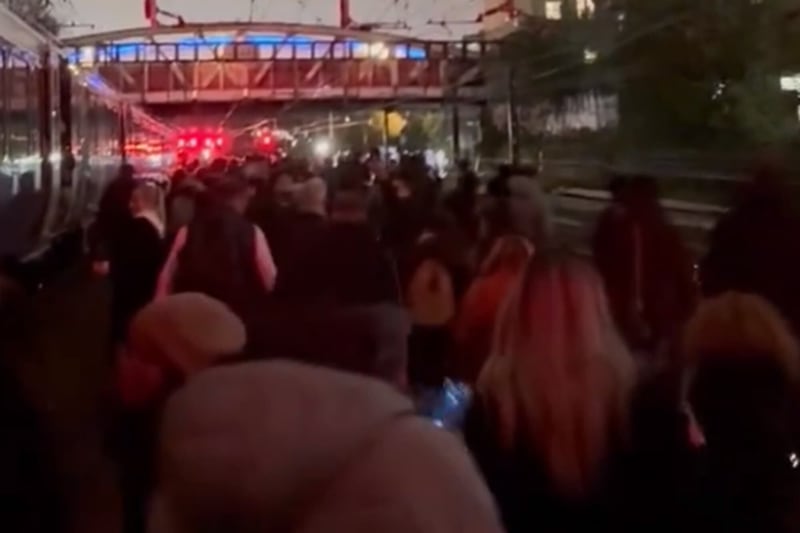Taoiseach Leo Varadkar has said Transport Minister Eamon Ryan’s major review of rail infrastructure makes the case for further investment in roads.
The divergence between the two party leaders on infrastructure investment follows the publication of the All-Island Rail Review on Tuesday.
The 25-year plan called for new lines, electric trains and faster services to connect major cities north and south of the border.
After bringing the report to Cabinet, Minister for Transport and the Environment Mr Ryan told reporters it represented “a new age of rail”.
“This country, back in the 1920s, had probably the most dense rail network in the world. We’re going to add to what’s existing and bring back high-speed rail, frequent rail, rail freight, better balanced regional development.”
If all 30 recommendations were implemented in the coming years, it would cost an estimated 36.8 billion euros, with 27.6 billion euros to be provided by the Irish Government.
The Green Party leader said: “It’s not cheap, but at the same time not doing it would be incredibly expensive. Our country would be gridlocked, our emissions would be rising – this gives us a better alternative, a transport system that works for everyone.”
However, Fine Gael leader Mr Varadkar said he believed the report made the case for further investment in road networks as there would only be small increases in rail usage under the plan.
The review says that investment could boost the total number of passengers travelling by train from 3% to 6%, and freight transported by rail would increase by 1% to 10%.
The Taoiseach said this finding proved that more investment in roads would be needed to meet demand from an increasing population and expanding economy.
He said: “Even if we do everything that they say we could do by 2050, the amount of freight going by rail will go from 1% to 10%.
“So still 90% of freight will go by road and the percentage of people who get around by train – commuters, passengers – will go from 3% to 6%.
“So, this still means 94% of people travelling by road or by footpath, even if we did all of these things that are in that plan between now and 2050.”

The Taoiseach said: “That makes the case, to me, for more road investment.”
He said the railway plan was “really ambitious”, but added: “There are limitations in a country of this size.”
Asked about these comments on Tuesday, Mr Ryan said the 10% figure for rail freight was a “starter” target, and that he “absolutely” sees the demand being above that figure.
He said: “I’m absolutely confident when we provide the service, the business community, which know they have to decarbonise, will roll in behind that.
“The same with public transport numbers, every single occasion where we’ve provided new public transport services, the public flock to it – so don’t see that as a limit on ambition. That’s actually the bare minimum of what we need to do.”
Mr Ryan added: “I believe when we create a freight option in Dublin Port, a real one, and in Rosslare, and in Cork and Waterford and in Limerick, we will see that switch to freight way beyond 10%. That was set as an indicator of the medium-lower average is in the European Union – we’re currently at 1%.”

He acknowledged that the All-Island Rail Review was “ambitious”, but said that “we won’t stop there”.
Mr Ryan added: “I don’t believe that will be the limit of our ambition, and I believe in a world that is changing the way this world is changing, because of climate change, no-one can set a restriction in terms of how we’re going to go.
“We know we have to decarbonise and I believe it’ll be easier in particular in the haulage sector to do that via rail freight, rather than any other method. So I expect us to blow through that sort of ambition to go far (further).”
He said in addition to that, Ireland had an obligation to boost its rail network in order to reduce its emissions.
While Ireland’s greenhouse gas emissions decreased by 1.9% in 2022 overall, missing its target of 6/7%, emissions in the transport sector of the Irish economy increased by 6%.

“We need to lower our emissions for transport, they went up last year, they have to start coming down radically,” Mr Ryan said on Tuesday.
“Those indicative figures, 10% of rail freight, was just set out as a starter as to what we could achieve.
“We have to make sure that in every area, we’re investing for the future. By the time this investment is rolled out by 2050, we’re going to be in a world that is changing.
“That’s going to require every country to play its part in stopping the burning of this planet. And that inspires the vision. It’s one of future sustainability where we’re actually green in everything we’re doing.”








